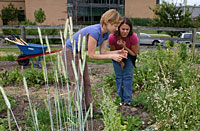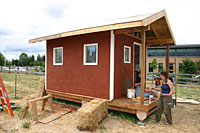This content was published: August 1, 2006. Phone numbers, email addresses, and other information may have changed.
It's easy being green at Portland Community College
Photos and story by James Hill
PORTLAND, Ore. Sustainable practices come in all shapes and sizes. No where is that more true than at PCC.
This summer, PCC’s sustainability coordinator Noelle Studer is making sure people at the college and in the community think “green” first. Studer has been hosting learning garden work parties all summer. The parties are where staff and students pick ripe vegetables and in the process learn about organic gardening. To date, the group has delivered more than 70 pounds of greens, peas, radishes, onions, tomatoes and broccoli to the Oregon Food Bank in Washington County.
“The learning garden is a great way to bring people together,” Studer said. “There is a lot of potential of goodwill building here. Every PCC campus can do this.”
Future work parties will be held from 10 a.m. to noon, Thursday, Aug. 3 and Thursday, August 17 at the learning garden across from Building 9 of the Rock Creek Campus, located at 17705 N.W. Springville Road. For more information about future sustainability events, visit www.pcc.edu/sustainability.
The garden is a community affair at the college. Instructor Kevin Lien’s 2005 organic gardening class helped design the garden and perform soil tests. Landscape Technology instructor Loren Radford built the irrigation system and students from the organic gardening class used the space to experiment with cultivation practices.
But the “going green” initiative doesn’t stop at the community garden. The college’s Parking and Transportation Office participated in the July Carefree Commuter Challenge, sponsored by the Westside Transportation Alliance. The challenge was to encourage PCC employees and students to bike, walk, bus or carpool to campus, improving their health and cutting down on pollution.
According to WTA, a single driver who commutes 25 miles round-trip getting 15 miles per gallon at $3 per gallon is spending about $5 daily on gas, $26 per week, or $108 per month. PCC is competed with employers from all over the Portland metro area for the most participants.
Studer is also shepherding a $69,858 Advanced Technological Education Planning Grant from the National Science Foundation. This grant supports the planning of the Cascadia Regional Institute for Sustainability Education in Oregon and southwest Washington. The core planning team consists of faculty from PCC, Lane Community College, Portland State University and Portland Public Schools.
The sustainability initiative doesn’t stop there. Spencer Hinkle, building trades instructor, oversees the three-year, $700,000 National Science Foundation grant to develop the “Framing Student Success” project at the Rock Creek Campus. During the last three summers, the Building Construction Technology program designed “green” structures where local high school students learned about green construction from faculty and area experts. Last year, students completed work on a straw bale weather station sealed with clay. It retains heat in the winter and cool air in the summer and costs about a fraction of traditional home building techniques.
This year, 12 students and five high school teachers worked hard to make a garden shed for Studer’s learning garden. The structure is temporary and can be moved depending on campus needs. Unlike the weather station, the garden shed was built with a technique that mixes straw with clay. PCC construction students built the frame for the high school students, who then filled in the rest with the straw-clay mixture.
“It’s something that is easily demonstrated,” said Lydia Doleman, the lead BCT faculty on the project. “It blends modern construction technology with alternative construction. It’s a natural building technique anyone can do and is a great hands-on learning project for the students.”
In “Framing Student Success,” the high school participants start out designing plans of their project and make miniature models to present to PCC faculty. The second year, they build the project and in the final year they participate in an internship within the construction industry.
“The best part about this is that we’re actually building a building out of mud and it really works,” said Kyle Brainard, a 17-year-old student at Franklin High School. “I like the idea of ‘green’ buildings.”
And the teachers work along side students in building the structures, learning methods to impart to their own classes. Dave Kaechele, who is an automotive and wood-working teacher at Sandy High School, has been impressed.
“It’s been great to learn about the different materials, methods and chemistry involved in building these structures,” Kaechele said. “It takes a lot less money and less labor than conventional construction. It’s really an inexpensive way to make a home. It’s also energy efficient. I plan to use this information and build a structure similar to this in my class.”
For more information on the BCT “Framing Student Success” program contact Spencer Hinkle at 503-614-7405. Or for information about sustainability at PCC, call Noelle Studer at 503-614-7635.
Portland Community College is the largest post-secondary institution in Oregon, serving approximately 91,000 full- and part-time students. For more PCC news, please visit us on the Web at www.pcc.edu/news. PCC has three comprehensive campuses, five workforce training and education centers, and 200 community locations in the Portland metropolitan area. The PCC district encompasses a 1,500-square-mile area in northwest Oregon and offers two-year degrees, one-year certificate programs, short-term training, alternative education, pre-college courses and life-long learning.
